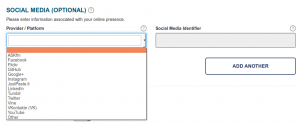Obama Admin’s parting gift to foreign visitors: social media surveillance
In the Obama Administration’s parting gift to foreign visitors, the Office of Management and Budget (OMB) has approved the collection of social media IDs from foreign visitors to the US. As part of the online Electronic System for Travel Authorization (ESTA), tourists, business travelers, and foreign citizens visiting friends and relatives in the US are now being asked whether they have accounts on any social media platforms, and if so, their user names or IDs.
ESTA is, in effect, an online “electronic visa” system. The US does not issue any visas on arrival at borders or airports, and does not allow transit without a visa. Visitors to the US from most countries must obtain a visa in advance, which requires a personal interview at a US Embassy or Consulate and costs a minimum of $160 even for a tourist or transit visa. Visitors from more favored countries in the Visa Waiver Program (VWP) are allowed to enter the US temporarily without a paper visa, for limited-duration stays for limited purposes, if they have obtained permission in advance, for a fee of $14, through the ESTA website operated by US Customs and Border Protection (CBP).
OMB approved the social media surveillance scheme on Monday, December 19th. The new questions (screenshot) showed up on the online ESTA application form the next day, December 20th. This suggests that CBP had already spent the money to add fields to the database and modify the Web forms before receiving the required OMB permission to collect this new data about foreign visitors.
The dropdown menu on the online ESTA form asks specifically for user IDs on the following social media platforms:
- ASKfm
- Flickr
- GitHub
- Google+
- JustPaste.it
- Tumblr
- Vine
- VKontakte (VK)
- YouTube
There’s also a button to add IDs on other social media platforms not listed in this menu.
The question is labeled as “optional.” But the entire ESTA application is optional: You don’t have to fill out the form if you don’t want to travel to, or transit via, the US. Most visitors will assume either that a response is required, or that failure to respond could affect their ESTA application adversely.
CBP claimed in one of its submissions to OMB that, “Not answering the optional question will not result in an automatic denial…. If an applicant chooses not to answer the optional question regarding social media, the ESTA application can still be submitted without a negative interpretation or inference.” But crucially, this claim is not mentioned on the ESTA website for applicants.
More than 99.5% of the comments received by CBP from the public opposed social media surveillance of tourists and business and social visitors. CBP reported to OMB that it received 3,973 comments in opposition to its proposal, and 18 comments in support.
Organizations and individuals questioning the social media surveillance proposal included the Identity Project and the U.N. Special Rapporteur on the Right to Freedom of Opinion and Expression. So far as we know, this is the first time that the U.N. Special Rapporteur on Freedom of Expression has formally intervened in a U.S. administrative rulemaking on the basis that a proposed rule would violate the internationally recognized human right to freedom of speech. So far as we can tell, the U.N. Special Rapporteur has not received the courtesy of a reply from the U.S. government.

Pingback: Obama Admin’s parting gift to foreign visitors: social media surveillance | Media Unveiled
Pingback: Papers, Please! » Blog Archive » Carrier sanctions kill. Airlines collaborate.
Pingback: Papers, Please! » Blog Archive » What should you to do if you are asked for your password at a US airport or border?
Pingback: Papers, Please! » Blog Archive » FAQ: U.S. government monitoring of social media
Pingback: Papers, Please! » Blog Archive » Civil liberties and human rights groups denounce illegal DHS social media monitoring
Pingback: State Department proposes more surveillance of social media, communications, and travel | Papers, Please!